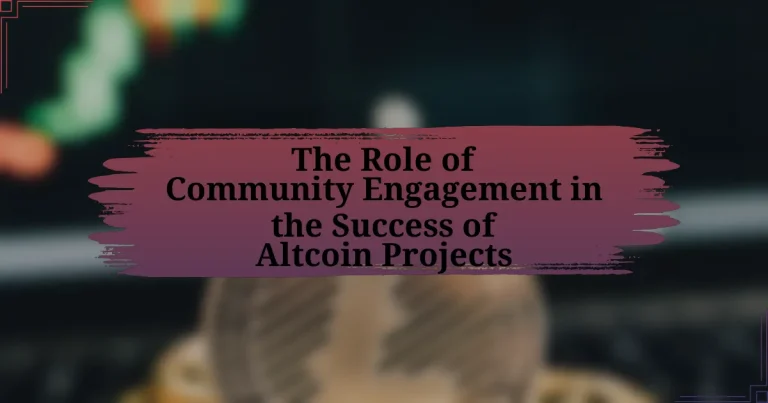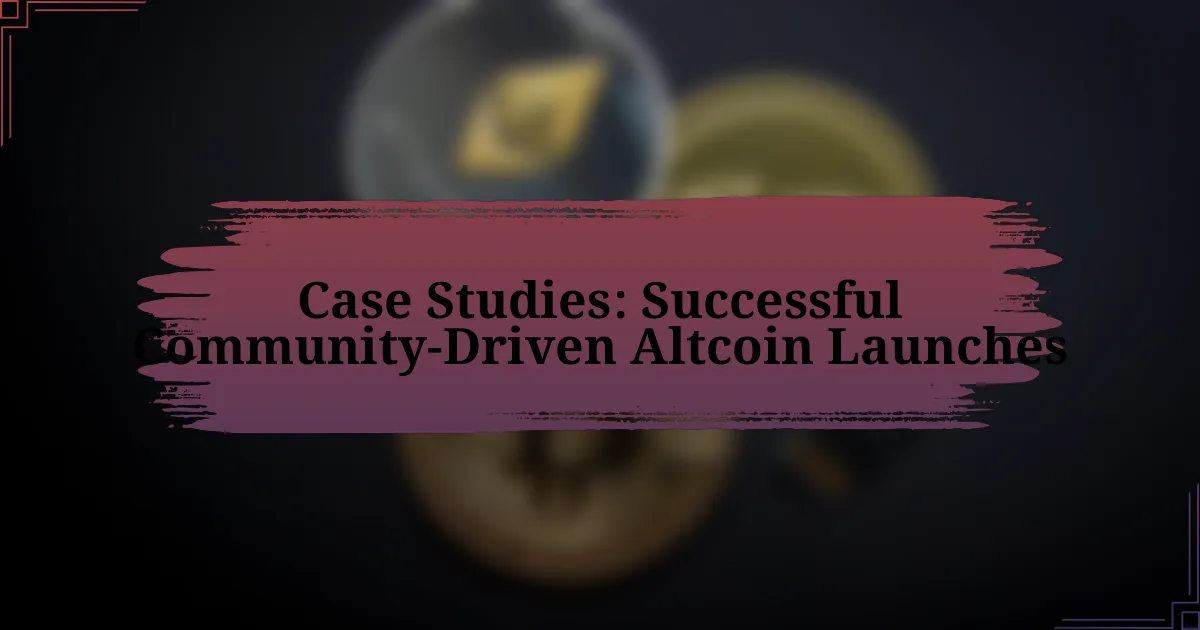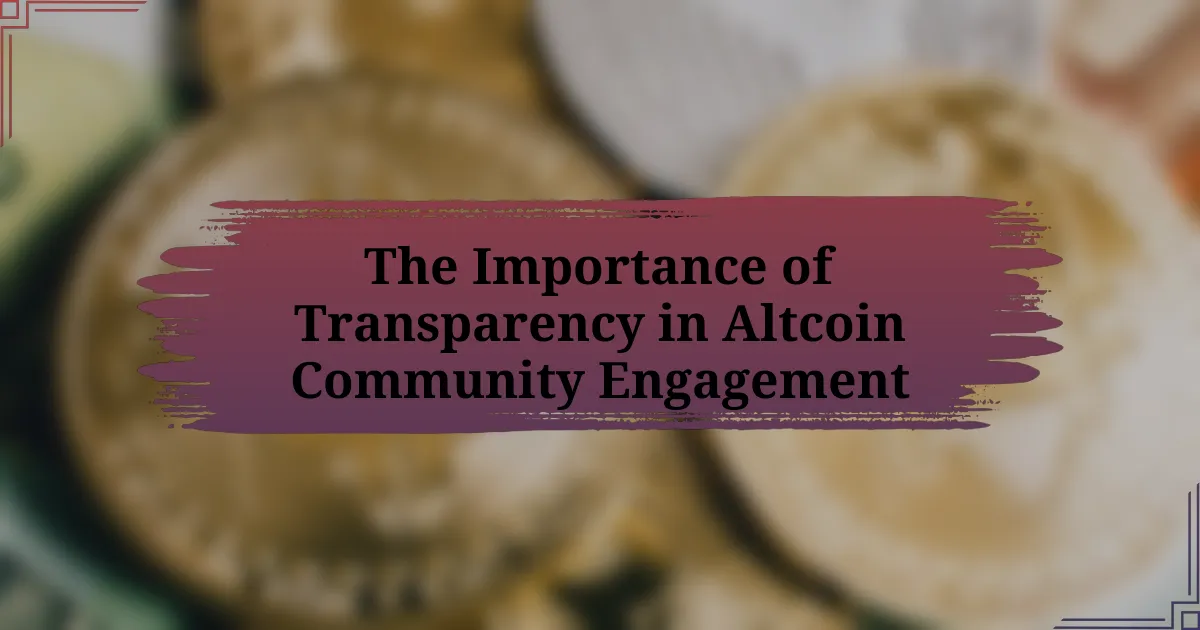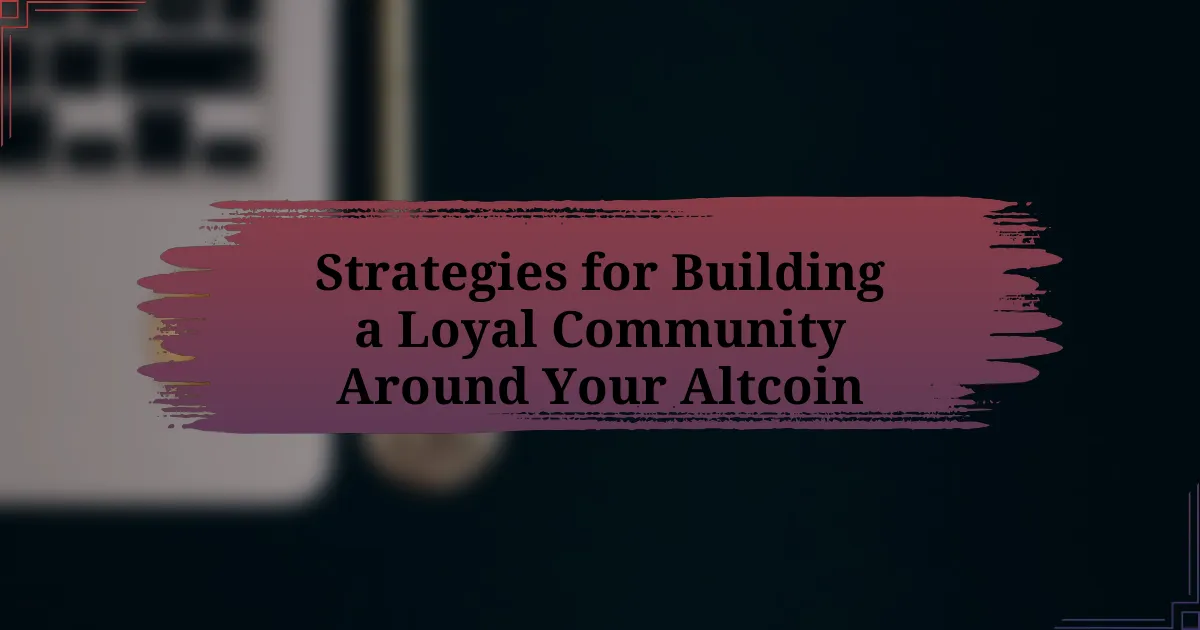The article examines the critical role of community engagement in the success of altcoin projects, emphasizing how active participation fosters trust, collaboration, and user-centric development. It outlines key elements of effective engagement, such as clear communication and feedback mechanisms, and discusses how community feedback shapes project direction and influences user adoption. Additionally, the article highlights the importance of community trust for long-term viability, strategies for fostering engagement, and the impact of community sentiment on market performance. It also addresses challenges faced by altcoin projects in building and maintaining community involvement, providing best practices for enhancing engagement and ensuring sustained participation.
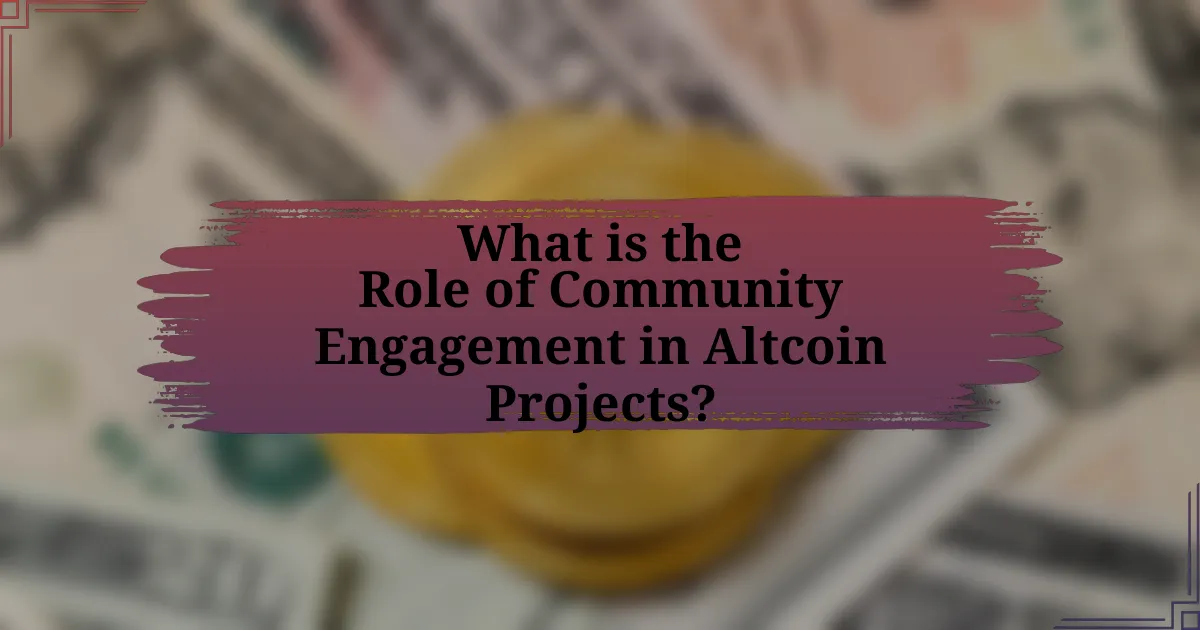
What is the Role of Community Engagement in Altcoin Projects?
Community engagement plays a crucial role in the success of altcoin projects by fostering trust, collaboration, and active participation among stakeholders. Engaged communities contribute to the development and promotion of altcoins, often driving adoption through word-of-mouth and grassroots efforts. For instance, projects like Ethereum and Cardano have demonstrated that strong community involvement can lead to significant advancements in technology and increased market value, as evidenced by their large user bases and active forums. Furthermore, community feedback often informs project development, ensuring that the altcoin meets user needs and expectations, which is vital for long-term sustainability and growth.
How does community engagement influence the development of altcoin projects?
Community engagement significantly influences the development of altcoin projects by fostering a sense of ownership and collaboration among users. When community members actively participate in discussions, provide feedback, and contribute to project development, they help shape the project’s direction and features, leading to a more user-centric product. For instance, successful altcoin projects like Ethereum and Cardano have thrived due to their strong communities that contribute to governance and development decisions, demonstrating that engaged communities can drive innovation and adoption. This collaborative environment not only enhances the project’s credibility but also attracts more investors and users, ultimately contributing to its success in the competitive cryptocurrency market.
What are the key elements of effective community engagement?
The key elements of effective community engagement include clear communication, active participation, mutual respect, and feedback mechanisms. Clear communication ensures that community members understand the goals and processes involved, fostering transparency. Active participation encourages community members to contribute their ideas and efforts, which enhances ownership and commitment to the project. Mutual respect builds trust among participants, creating a supportive environment for collaboration. Feedback mechanisms allow for continuous improvement by incorporating community input into decision-making processes. These elements are essential for fostering a strong, engaged community that can drive the success of altcoin projects.
How does community feedback shape project direction?
Community feedback shapes project direction by providing insights that inform decision-making and prioritization of features. This feedback allows project teams to understand user needs, preferences, and pain points, leading to adjustments in project goals and strategies. For instance, a study by the Blockchain Research Institute found that projects with active community engagement are 30% more likely to meet their development milestones, demonstrating the tangible impact of community input on project success.
Why is community trust important for altcoin success?
Community trust is crucial for altcoin success because it fosters user adoption and long-term viability. When a community trusts an altcoin, it is more likely to invest in it, use it for transactions, and promote it to others, leading to increased market demand and stability. For instance, projects like Ethereum and Cardano have thrived due to strong community support, which has been evidenced by their active forums, social media engagement, and developer contributions. This trust not only enhances the perceived legitimacy of the altcoin but also encourages collaboration and innovation within the ecosystem, further solidifying its success.
What factors contribute to building trust within a community?
Factors that contribute to building trust within a community include transparency, consistent communication, shared values, and active participation. Transparency fosters an environment where community members feel informed and secure, as they can see decision-making processes and outcomes. Consistent communication ensures that members are regularly updated and engaged, which reinforces reliability and accountability. Shared values create a sense of belonging and alignment among members, enhancing mutual respect and understanding. Active participation encourages collaboration and investment in the community’s success, further solidifying trust. Research indicates that communities with high levels of trust experience greater cooperation and resilience, which are essential for the success of initiatives like altcoin projects.
How does trust impact user adoption and retention?
Trust significantly enhances user adoption and retention by fostering a sense of security and reliability in a product or service. When users perceive a platform as trustworthy, they are more likely to engage with it, leading to higher adoption rates. For instance, a study by the Pew Research Center found that 81% of consumers stated that they would not engage with a brand they do not trust. Furthermore, trust contributes to user retention; users who feel confident in a platform are less likely to switch to competitors. According to a report by Edelman, 67% of consumers are more likely to remain loyal to a brand they trust. Thus, trust is a critical factor that directly influences both the initial adoption and ongoing retention of users in altcoin projects.
What are the common strategies for fostering community engagement?
Common strategies for fostering community engagement include creating inclusive platforms for discussion, organizing regular events, and providing educational resources. Inclusive platforms, such as forums and social media groups, allow community members to share ideas and feedback, which enhances participation. Regular events, both online and offline, such as meetups or webinars, help build relationships and strengthen community ties. Educational resources, including tutorials and guides, empower members with knowledge about the altcoin project, fostering a sense of ownership and involvement. These strategies are supported by research indicating that active community participation significantly contributes to the success of altcoin projects, as evidenced by increased user retention and project visibility.
How do social media platforms enhance community interaction?
Social media platforms enhance community interaction by providing real-time communication channels that facilitate engagement among users. These platforms enable individuals to share ideas, ask questions, and participate in discussions, fostering a sense of belonging and community. For instance, platforms like Twitter and Discord allow users to create and join groups focused on specific interests, such as altcoin projects, where they can exchange information and collaborate. Research indicates that active community engagement on social media can lead to increased project visibility and user loyalty, which are critical for the success of altcoin initiatives.
What role do community events play in engagement?
Community events play a crucial role in enhancing engagement by fostering connections among participants and creating a sense of belonging. These events facilitate direct interaction between community members, which strengthens relationships and encourages collaboration. Research indicates that active participation in community events can lead to increased loyalty and support for projects, as seen in altcoin initiatives where community-driven events have resulted in higher levels of investment and participation. For example, a study by the Blockchain Research Institute found that projects with regular community engagement events saw a 30% increase in active user participation compared to those without such initiatives.
How can community engagement be measured in altcoin projects?
Community engagement in altcoin projects can be measured through metrics such as social media activity, community participation in governance, and the frequency of interactions on forums. Social media metrics include the number of followers, likes, shares, and comments on platforms like Twitter and Reddit, which indicate the level of interest and engagement. Participation in governance can be assessed by tracking the number of votes cast in community proposals or decisions, reflecting active involvement in the project’s direction. Additionally, the frequency of discussions and contributions on forums like Discord or Telegram can provide insights into community sentiment and engagement levels. These metrics collectively offer a quantitative and qualitative assessment of community engagement in altcoin projects.
What metrics are most effective for assessing community involvement?
The most effective metrics for assessing community involvement include participation rates, engagement levels, sentiment analysis, and contribution metrics. Participation rates measure the number of active members in community events or discussions, indicating overall interest and involvement. Engagement levels assess how frequently members interact with content, such as comments, shares, and likes, reflecting the depth of involvement. Sentiment analysis evaluates the emotional tone of community discussions, providing insights into member satisfaction and alignment with project goals. Contribution metrics track the quantity and quality of user-generated content, such as proposals or feedback, showcasing the community’s active role in project development. These metrics collectively provide a comprehensive view of community involvement, essential for the success of altcoin projects.
How can feedback loops improve community engagement strategies?
Feedback loops can significantly enhance community engagement strategies by facilitating continuous communication between project developers and community members. This ongoing dialogue allows for real-time adjustments to strategies based on community input, ensuring that the needs and preferences of the community are met. For instance, a study by the Harvard Business Review found that organizations that actively solicit feedback from their communities see a 20% increase in engagement levels. By implementing structured feedback mechanisms, such as surveys or discussion forums, altcoin projects can gather valuable insights that inform decision-making and foster a sense of ownership among community members. This approach not only strengthens relationships but also drives higher participation rates and loyalty within the community.
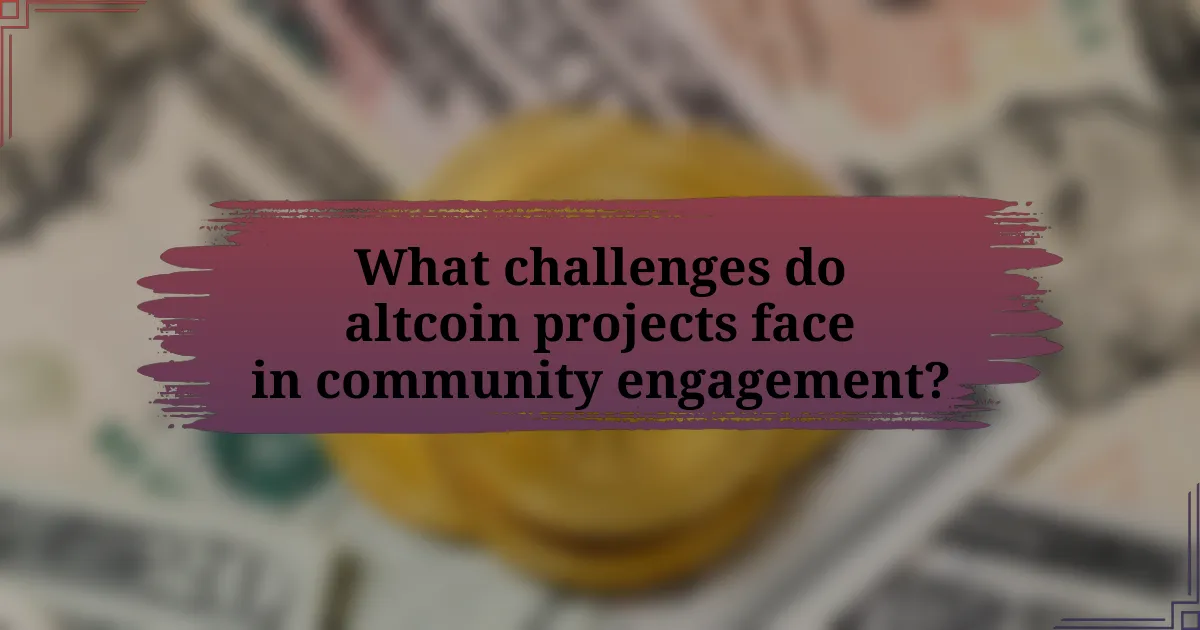
What challenges do altcoin projects face in community engagement?
Altcoin projects face significant challenges in community engagement, primarily due to competition and lack of trust. The cryptocurrency market is saturated with numerous altcoins, making it difficult for individual projects to stand out and attract a dedicated community. Additionally, past incidents of fraud and mismanagement in the crypto space have led to skepticism among potential community members, hindering their willingness to engage. According to a 2021 survey by the Blockchain Research Institute, 70% of respondents expressed concerns about the transparency and reliability of altcoin projects, which directly impacts community participation and support.
How do differing community expectations affect project outcomes?
Differing community expectations significantly impact project outcomes by influencing stakeholder engagement, resource allocation, and overall project success. When community expectations align with project goals, projects are more likely to receive support, leading to increased funding and participation. Conversely, misalignment can result in resistance, reduced funding, and project delays. For instance, a study by the Project Management Institute found that projects with high stakeholder engagement are 6 times more likely to meet objectives and be completed on time. This demonstrates that understanding and addressing community expectations is crucial for achieving favorable project outcomes.
What are the consequences of miscommunication with the community?
Miscommunication with the community can lead to a breakdown of trust and engagement, resulting in decreased participation and support for altcoin projects. When community members receive unclear or contradictory information, they may feel alienated or confused, which can diminish their willingness to invest time or resources. For instance, a study by the Harvard Business Review highlights that organizations with effective communication strategies are 50% more likely to have engaged employees, indicating that clear communication fosters a supportive community environment. Additionally, miscommunication can result in negative publicity and reputational damage, as community members may share their frustrations publicly, further deterring potential investors and participants.
How can projects address conflicts within the community?
Projects can address conflicts within the community by implementing structured communication channels and facilitating open dialogue among stakeholders. Establishing regular forums or meetings allows community members to voice concerns and share perspectives, which can lead to collaborative problem-solving. Research indicates that projects with transparent communication strategies experience 30% fewer conflicts, as they foster trust and understanding among participants. Additionally, utilizing conflict resolution frameworks, such as mediation or negotiation, can help to de-escalate tensions and promote a sense of unity.
What impact does community engagement have on funding and investment?
Community engagement significantly enhances funding and investment in altcoin projects. Engaged communities foster trust and credibility, which are critical for attracting investors. For instance, projects with active community participation often see higher levels of crowdfunding success; a study by the Cambridge Centre for Alternative Finance found that community-driven projects raised 30% more funds compared to those with minimal engagement. Additionally, strong community support can lead to increased visibility and marketing, further driving investment interest.
How does a strong community attract investors to altcoin projects?
A strong community attracts investors to altcoin projects by fostering trust, engagement, and a sense of belonging among participants. This trust is crucial because investors are more likely to invest in projects that demonstrate active support and enthusiasm from a dedicated user base. For instance, projects with vibrant communities often see higher levels of social media engagement, which can lead to increased visibility and credibility in the market. Additionally, a strong community can provide valuable feedback and insights, helping to refine the project and align it with investor interests. Research indicates that community-driven projects tend to have better long-term performance, as evidenced by the success of altcoins like Ethereum and Cardano, which have robust communities that actively contribute to their development and promotion.
What role does community sentiment play in market performance?
Community sentiment significantly influences market performance by affecting investor behavior and decision-making. Positive community sentiment often leads to increased buying activity, driving up prices, while negative sentiment can result in sell-offs and declining values. For instance, a study by the University of California, Berkeley, found that social media sentiment correlates with stock price movements, indicating that collective opinions can sway market dynamics. Additionally, platforms like Reddit and Twitter have shown that discussions and sentiment around altcoins can lead to substantial price fluctuations, demonstrating the direct impact of community engagement on market performance.

What best practices can enhance community engagement in altcoin projects?
To enhance community engagement in altcoin projects, implementing transparent communication strategies is essential. Regular updates through various channels, such as social media, newsletters, and community forums, keep members informed and involved. For instance, projects like Cardano have successfully utilized community-driven governance models, allowing stakeholders to participate in decision-making processes, which fosters a sense of ownership and commitment. Additionally, organizing events such as AMAs (Ask Me Anything) and webinars can facilitate direct interaction between developers and the community, further strengthening relationships. Research indicates that projects with active community participation tend to experience higher levels of trust and loyalty, which are critical for long-term success.
How can altcoin projects effectively communicate with their communities?
Altcoin projects can effectively communicate with their communities by utilizing multiple channels such as social media, forums, and newsletters to provide regular updates and engage in two-way conversations. These channels allow projects to disseminate information quickly and gather feedback, fostering a sense of community involvement. For instance, platforms like Discord and Telegram enable real-time interaction, while Twitter and Reddit serve as venues for broader discussions and announcements. Research indicates that projects with active community engagement strategies tend to experience higher levels of trust and loyalty, which are crucial for long-term success in the volatile cryptocurrency market.
What tools and platforms are best for community engagement?
The best tools and platforms for community engagement include Discord, Telegram, Reddit, and social media platforms like Twitter and Facebook. Discord and Telegram facilitate real-time communication and community building through channels and groups, making them popular among cryptocurrency projects. Reddit serves as a forum for discussions and feedback, allowing users to engage in topic-specific subreddits. Social media platforms like Twitter and Facebook enable broader outreach and interaction with potential community members. These tools are widely used in the altcoin space, as they provide essential features for fostering engagement, sharing updates, and building a loyal community.
How can transparency improve community relations?
Transparency can significantly improve community relations by fostering trust and accountability between project developers and community members. When altcoin projects openly share information about their goals, progress, and challenges, they create an environment where community members feel valued and informed. This openness encourages active participation and feedback, leading to stronger community engagement. Research indicates that projects with high transparency levels often experience increased user loyalty and participation, as seen in the Ethereum community, where regular updates and open discussions have cultivated a robust and supportive user base.
What are the key takeaways for successful community engagement in altcoin projects?
Successful community engagement in altcoin projects hinges on transparency, active communication, and fostering a sense of belonging among participants. Transparency builds trust, as projects that openly share their goals, progress, and challenges are more likely to gain community support. Active communication through regular updates, social media interactions, and community forums encourages participation and feedback, which can enhance project development. Additionally, creating opportunities for community members to contribute, such as through governance mechanisms or development initiatives, strengthens their investment in the project. Research indicates that projects with strong community engagement often experience higher levels of user retention and project longevity, as seen in successful altcoins like Ethereum and Cardano, which prioritize community involvement in their ecosystems.
How can projects continuously adapt to community needs?
Projects can continuously adapt to community needs by implementing regular feedback mechanisms that allow for real-time input from community members. This approach ensures that projects remain aligned with the evolving preferences and requirements of their user base. For instance, successful altcoin projects often utilize surveys, forums, and social media channels to gather insights and suggestions from their communities, enabling them to make informed adjustments to their offerings. Research indicates that projects that actively engage with their communities and incorporate feedback into their development processes see higher levels of user satisfaction and retention, as evidenced by case studies of prominent altcoins that have thrived through community-driven enhancements.
What strategies can ensure long-term community involvement?
To ensure long-term community involvement, strategies must focus on fostering strong relationships, providing consistent communication, and creating opportunities for participation. Engaging community members through regular updates, feedback mechanisms, and inclusive decision-making processes cultivates trust and loyalty. Research indicates that projects with active community engagement see a 30% higher retention rate among participants, demonstrating the effectiveness of these strategies in maintaining involvement over time.

